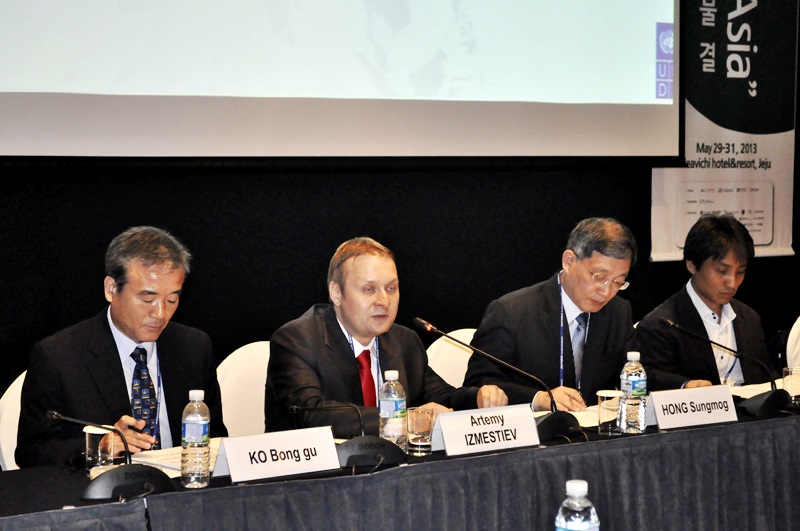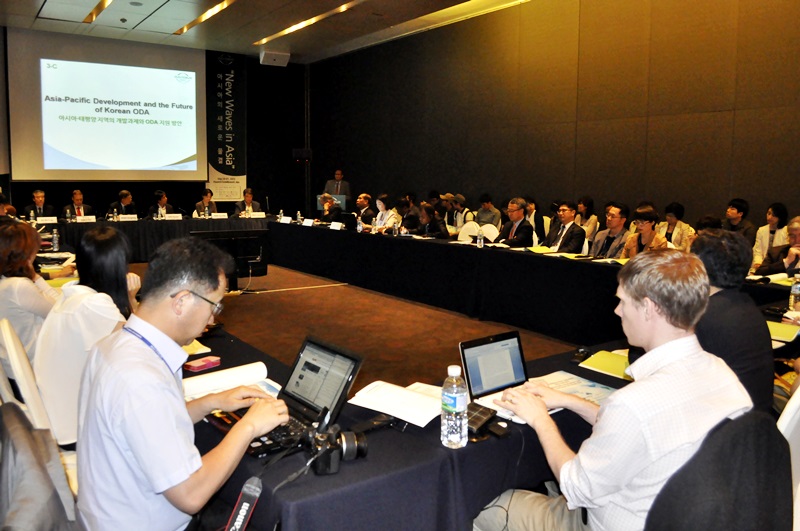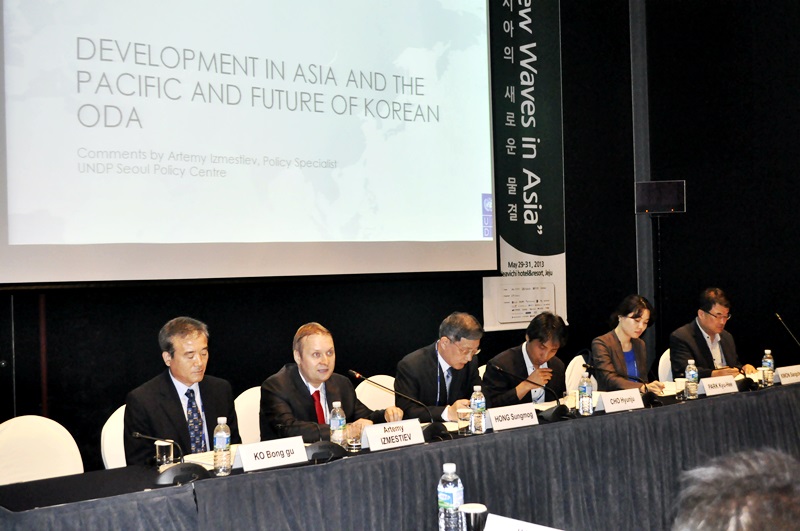| |
 |
|
| |
To read more about Jeju's aid program to East Timor, click here.
Jeju Forum for Peace and Prosperity 2013 - Asia-Pacific and the future of Korean ODA
In the early morning session in Room C international development professionals came together to discuss Korea’s role in a changing Asia. The focal point of the session was Korea’s role in providing ODA to Timor-Leste and particularly Jeju Special Self-Governing Province’s own ODA provided through the Peace and Cooperation Division.
In his opening remarks, Seo Kyung-suk, former Korean Ambassador to Timor-Leste, reminded the audience of Korea’s recent experience of the poverty it is now attempting to eradicate overseas. Recalling the effort his generation had put in to advance the country, Seo said, “I hope other countries can take guidance from how Korea developed so fast.”
Following Seo was the current Timor-Leste Foreign Affairs Minister, Jose Luis Guterres, who thanked Korea for its support of his country. Guterres stressed that Korea had passed on its own development experience in investing in human resources in Timor-Leste through education fund and health. He stated that progress was being made and the state had set a target of 2030 to become a middle-income nation.
“In 2002 per-capita income was 475 US dollars per capita and now today it is 6000…this does not reflect the development of our country as it is revenue from oil and gas, but we have a commitment to invest it in infrastructure and human resources…we hope that Korea can help us in developing this strategic plan.”
| |
 |
|
| |
There then came a brief introduction to the ODA field in Asia from Izmestiev, a policy specialist from the UNDP in Seoul. He outlined the “the growing diversity of development and development actors.” In a sign of the maturation of the Asian economy, it was shown that states had lessened their reliance on ODA relative to taxes through growth and natural resources. In what was a theme across the Forum, south-south cooperation was increasingly important to the development field.
Cho stressed the need for balanced development in beneficiary countries, such as Timor-Leste; he highlighted how the nation’s two-digit growth rate was heavily weighted towards urban areas and the energy industries, with rural communities lagging behind in agriculture, education and basic human needs. Korea’s own projects in the country were seeking to overcome this.
“…the ultimate goal is to increase the influence of the people – capacity build and allow them to take the initiative in regional development…strengthen the capacity of the citizens so the local residents can take the initiative and develop their region.”
Park Kyu-hee of KOICA, who was central in setting up Jeju’s own ODA program, reminded the audience that development missions overseas have far-reaching impacts on the local community – which are not always completely positive. She highlighted the need to ensure that projects do not leave the country without supporting local staff to find new positions; short-termism and wage inflation often distort the local job market.
| |
 |
|
| |
Jeju’s Deputy Director for International Relations, Ko Bong-gu, then introduced in more detail Jeju’s own ODA work in Timor-Leste. Ko recalled Jeju’s experience of receiving 3.22 million US dollars of corn between 1963-67 and the project was part of Jeju’s “belated transition” to becoming a donor, as Korea had done. Ko stated that Jeju’s ODA project was driven by the universal value of peace and also Jeju and Timor-Leste’s shared experience of conflict.
In a indication of how ODA can not only connect governments but people, too, Ko stated that friendship societies had been set up in both communities; a delegation from Jeju will be visiting Timor-Leste in July to meet the Jeju friendship society in DIli, the nation’s capital. Ko also outlined in more detail the 60 million won medical equipment aid and the partnership agreement between Jeju National University Hospital and Dili National Hospital.
In closing, the importance of the Asia-Pacific region for Korean ODA was stressed – 60 percent of all bilateral aid goes to the region. The areas targeted – 70 percent of the aid - will remain basic human needs, such as education, child health and water supply. At this point the discussion returned to Seo’s opening statement about the need for diligence in pulling oneself out of poverty, as discussants agreed basic human needs and health are essential for a sound labor market.
Korea’s own experience of international aid continues to be a beacon for other Asian countries walking that same path and this session highlighted how intra-Asian cooperation was challenging traditional models of development. It was also clear that Jeju’s mission as an emerging donor is also increasing bilateral ties between nations in the Asia-Pacific region, which can only lead to a stronger and more cooperative region.
Moderator - Hong, Sungmog (Vice President, KOICA)
Congratulatory Remarks - Seo, Kyung-suk (Former Ambassador, Korean Embassy in Timor-Leste)
Keynote Speaker - Jose Luis Guterres (Foreign Affairs Minister, Timor-Leste)
Presenter - Park, Enna (Former Director-General for Development Cooperation, Ministry of Foreign Affairs)
Discussants
Park, Kyu-Hee (Deputy Director, ODA Research Team, KOICA / Former Resident Representative, KOICA Timor- Leste Office)
Artemy Izmestiev (Policy Specialist, UNDP Seoul Policy Center)
Cho, Hyunju (Secretary General, Global Civic Sharing)
Kwon, Sangcheol (Professor, Jeju National University)
Ko, Bong gu (Deputy Director, International Relations Jeju Special Self-Governing Province)
|






















